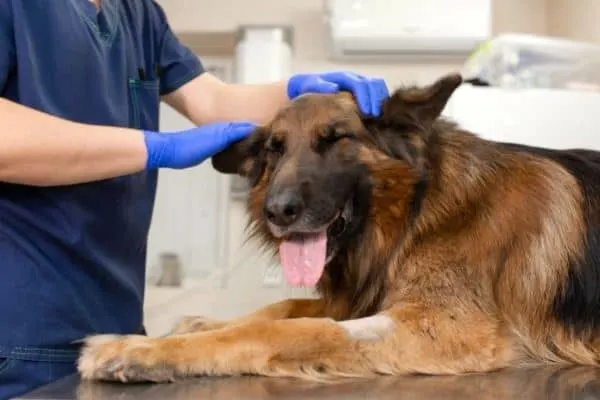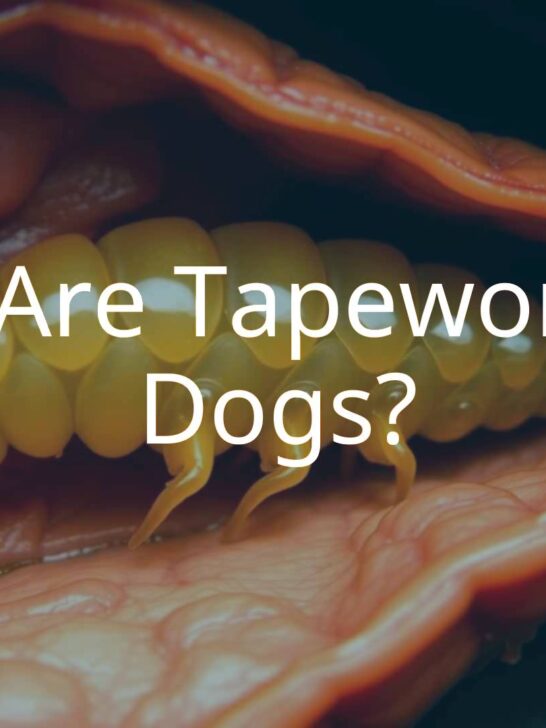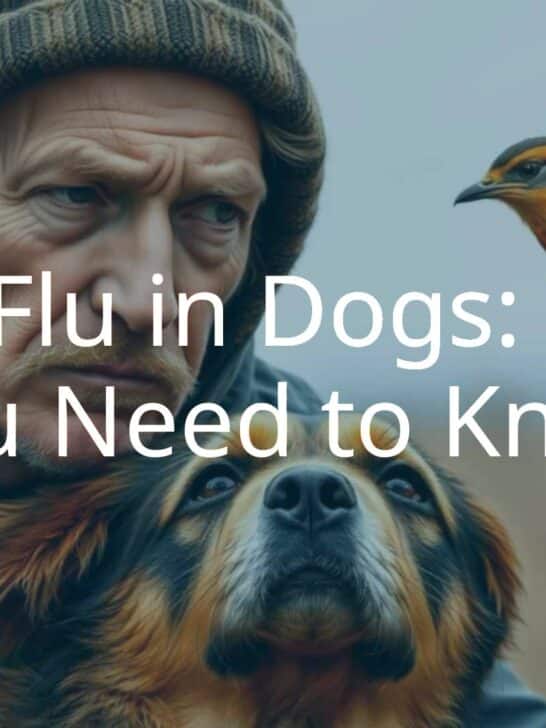Why Does My German Shepherd Have Dandruff: A Guide to Skin Issues in GSDs
If you have ever found yourself itching and scratching or dealing with dry, flaky skin and not knowing why you know exactly how uncomfortable dandruff can be.
But many German Shepherd owners have no idea that this same condition of dandruff can happen to their dog as well!
What causes a German Shepherd dog to have dandruff? How can you help your dog feel better and avoid more issues with GSD dandruff?
This article will give you all the details.
Why Does My German Shepherd Have Dandruff?
There are two main reasons why most German Shepherds have dandruff: genetic or environmental triggers.
In most cases, dandruff in dogs is actually a symptom of a deeper underlying health issue, not the health issue itself.
We will spend the rest of this article discussing the types of health issues that may cause dandruff for your German Shepherd and how to address each one effectively.

Hear from a Canine Veterinarian What Can Cause GSD Dandruff
In this YouTube video, a canine veterinarian explains one of the medical issues that may cause you to see dandruff-like skin flakes coming off your German Shepherd’s coat.
Because there are several different medical issues that may cause dandruff or extremely dry skin in German Shepherds, it is important not to try to self-diagnose your dog.
Making the time to schedule an appointment with your dog’s veterinarian can help you avoid wasting time and money on remedies that may make the issue worse.
Instead, you want to find out what it is right away and start on the right treatment.
See also: Do German Shepherds Smell?
How Do You Know Your German Shepherd Has Dandruff?
The first thing you need to know is how to tell if what you are seeing on your German Shepherd’s skin is actually dandruff.
As Aubrey Animal Medical Center points out, when it is your dog and not you who is suffering from allergies, the condition is typically called “atopy.”
Dandruff can be a symptom of atopy, which is a known genetic predisposition in the German Shepherd dog breed.
Signs and symptoms of atopy
For German Shepherds, atopy tends to really attack the skin (especially any folds of skin), the ears, the paw pads, and the belly area.
Atopy tends to not only cause dry skin but also itching.
In fact, itching is actually often more common and easy to recognize the sign of atopy than skin flaking.
This is because the GSD has such a thick double-layer coat that skin flakes may not be readily visible at first.
But if you see your dog repeatedly biting at their paws or skin, rubbing their ears or belly along a hard surface or rubbing at the face or eyes, atopy may be at the root of the problem.

Other warning signs and symptoms of German Shepherd dandruff
Here are other warning signs that your German Shepherd may be developing dandruff.
- You can see dry skin flakes when you use your hands to separate the dense coat to look at your dog’s skin
- The skin or coat appears to be greasy
- There is evidence of hair loss
- You see crusting or scale on the skin
- There is any kind of odor (including an odor of corn chips)
- You see areas of redness or inflammation or any pus or oozing
- Your dog seems visibly uncomfortable
What Causes Dandruff for German Shepherd Dogs?
As you might expect, there can be a number of contributing factors that may lead to dandruff in German Shepherd dogs.
Puppyhood
As Animal Planet explains, dry or flaky skin is pretty common for puppies regardless of breed.
The main reason for this is that puppies have to go through a process of completely shedding out their puppyhood coat and then growing in their new adult double-layer coat.
This can cause dry skin due to simple stress.
Another reason puppies may have dry skin issues is that their oil (sebaceous) glands are still not working at full strength.

Use of air conditioning and heating
Seasonal issues can also lead to seasonal dry skin, especially in full-on winter and summer with the use of heat or air conditioning really dries out the air inside your home.
Too many baths
As this thread on a popular German Shepherd owners forum points out, over-bathing a German Shepherd of any age is another common trigger for dandruff.
The German Shepherd coat is very specialized for this working dog breed.
As you have likely noticed, your dog’s coat is incredibly thick and has two layers: an upper water-resistant layer of coarse hair and a soft under-layer of insulating hair.
This coat type is designed to protect your dog from the elements and from the cold and wet.
So too much bathing can actually strip away the skin oils that keep the coat lubricated and functioning as it was designed to do.
Mites (“Walking Dog Dandruff”)
If the little white flakes you see on your dog’s skin and coat appear to be moving, they probably are.
In this case, it isn’t actually dandruff that is afflicting your German Shepherd. It is much more likely to be mites.
In fact, this condition is sufficiently common in German Shepherds that it has its own name – “Walking Dandruff” or (less catchily) Cheyletiella mites.
DVM360 explains that these tiny mites are actually a more common canine health issue in some geographic locations than are fleas!
Why does this mite produce dandruff? It actually feeds on the keratin in the outer layer of the skin. So when the mite walks around, it looks white.
It doesn’t help that these mites can be pretty large.
But they don’t just affect the skin. Mites have been documented as infesting nasal cavities, inner ears, and face as well.
And they can jump from your dog to you and cause skin lesions for you as well.
So you really want to get these mites off your dog as soon as you can!
Seborrhea
As Merck Veterinary Manual points out, seborrhea is a skin condition with genetic origins.
German Shepherds are one of the purebred dog breeds that are most commonly affected by what canine veterinarians call “primary seborrhea.”
Typically the condition will start to show up as early as a year and a half old and just continue to recur throughout life.
Seborrhea is uncomfortable all on its own, but it can get more dangerous when secondary infections set in.
Prompt treatment is vital for your dog’s overall health as well as the quality of life.

How to Treat Dandruff in German Shepherd Dogs
No matter why dandruff occurs in German Shepherds, what you really want most is to get it to stop. Your dog will feel better and then you will feel better.
So what can you do to treat dandruff in your GSD so it goes away?
1. Get the right diagnosis
As you now know, the first step is always to identify what you are dealing with. It could be anything from dry indoor air to a genetic condition.
Your dog’s veterinarian is always the right resource to accurately diagnose the problem and prescribe the right treatment.
2. Be patient
It can be really hard to be patient when your dog is suffering and you just want to make it better right away.
But often it can take some time to treat and resolve the underlying issue that has caused dandruff in the first place.
Dry skin issues can be particularly difficult to treat because symptoms may be similar in a variety of canine health issues.
For example, dry skin and dandruff can be caused by food allergies, seasonal or environmental allergies, mites, genetic skin issues, thyroid or hormone imbalances, poor nutrition, toxins, and other issues.
So your veterinarian may need to rule out a number of other health conditions before arriving at the diagnosis that best fits your dog’s condition.
3. Be willing to try new things
Some skin conditions in German Shepherds may actually need a combination approach to successfully treat them.
For example, you may need to try an elimination diet or limited ingredient diet to rule out food allergies.
You may also need to change shampoos or bathing schedules, add nutritional supplements to your dog’s diet, and use medicated treatments.
Some genetic skin conditions such as seborrhea may recur no matter what you do.
When your dog goes from puppyhood to adulthood or transitions into the senior dog years, changing hormone levels can dry out skin or make your dog vulnerable to parasites.
But when you understand the basic categories of canine health issues that can lead to dandruff, you will be able to recognize what you are seeing and take action quickly to help you and your dog feel better fast.
FAQ:
1. What causes dandruff in German Shepherds?
Answer:Most commonly, dandruff in German Shepherds is caused by genetic or environmental triggers. It can also be a symptom of an underlying health issue.
2. How can I tell if my German Shepherd has dandruff?
Answer:Signs of dandruff in German Shepherds include dry skin flakes, greasy skin or coat, hair loss, crusting or scaling on the skin, areas of redness or inflammation, and any pus or oozing. Your dog may also appear visibly uncomfortable and repeatedly bite at their paws, rub their ears or belly, or scratch at their face or eyes.
3. Can over-bathing cause dandruff in German Shepherds?
Answer:Yes, over-bathing a German Shepherd of any age is a common trigger for dandruff. The German Shepherd coat is designed to protect the dog from the elements and from the cold and wet. Too much bathing can strip away the skin oils that keep the coat lubricated and functioning as it was designed to do.
4. What is seborrhea and how does it affect German Shepherds?
Answer: Seborrhea is a skin condition with genetic origins that can affect German Shepherds. It usually starts to show up as early as a year and a half old and continues to recur throughout life. Seborrhea is uncomfortable on its own but can get more dangerous when secondary infections set in. Prompt treatment is vital for your dog’s overall health and quality of life.
5. How can I treat dandruff in my German Shepherd?
Answer: The first step is to get an accurate diagnosis from your dog’s veterinarian. Treatment options may include a combination approach such as an elimination diet, limited ingredient diet, changing shampoos or bathing schedules, adding nutritional supplements to your dog’s diet, and using medicated treatments. It is important to be patient and willing to try new things as some skin conditions in German Shepherds may take time and a variety of treatments to resolve.



















